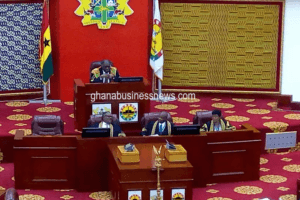Study finds 50% of Ghanaians know MPs as development advocates
 A study by the Political Science Department of the University of Ghana, has revealed that 50.8 per cent of Ghanaians know their Members of Parliament (MPs) as development advocates.
A study by the Political Science Department of the University of Ghana, has revealed that 50.8 per cent of Ghanaians know their Members of Parliament (MPs) as development advocates.
The opinion poll 2019 dubbed “Assessment of the 275 MPs – Perspective from the Constituents”; shows that Ghanaians view their MPs as the agents of socio-economic development in their constituencies; therefore, their representation role was relevant to the extent that they were able to represent the constituents’ interests and concerns in legislations (27.5 per cent).
Findings of the study, which was carried out from March to June, 2019 with funding from Konrad Adenauer Stiftung, was jointly presented on Monday in Accra by Dr Isaac Owusu-Mensah and Mr Kaakyire Frempong, both Senior Lecturers of the Political of the Political Science Department of the University of Ghana.
In all, a total of 27,500 Ghanaians in selected electoral areas within the 275 constituencies of Ghana participated in the study.
Across the 16 regions, voters in Oti 77.1 per cent of respondents linked their MPs’ role to rural development more than Western Region 68.7 per cent, Central 59.5 per cent, North East 59.1 per cent, Western North 58.1 per cent, Northern 54.3 per cent, Greater Accra 51.2 per cent and Ashanti 50.2 per cent.
Only in Upper West 58 per cent and Bono 40.7 per cent did the voters regard their MPs as representing their concerns in parliament.
It was evident from the study that, while some Ghanaian voters know their MPs as law-makers 6.2 per cent, support community groups 2.2 per cent, project local problems 1.6 per cent, resolve local conflicts 1.6 per cent and scrutinise legislations 1.3 per cent, half of respondents identified the MPs’ role as developmental.
Dr Owusu-Mensah said the studies in Political Science adopted Mixed Method Methodology that was the use of qualitative and quantitative through concurrent and transformative approaches.
He said five electoral areas were selected from each constituency with the exception of Ayawaso North and Ayawaso East which had three and four electoral areas each.
He noted that the HAT Method was used to randomly select the five electoral areas per constituency.
He said this method was used to select all the 1, 375 electoral areas for all the 275 constituencies.
Dr Owusu-Mensah said interviews were conducted at the appropriate electoral areas and constituencies to solicit key information to validate the quantitative data.
He said in each electoral area, 20 respondents were interviewed; therefore, with five electoral areas per constituency and were engaged.
He said in all, a total of 27,500 Ghanaians in selected electoral areas within the 275 constituencies of Ghana participated in the study and Ghanaian voters were familiar with the role or duties their MPs were expected to carry out in their respective constituency.
With promising development projects, 88.7 per cent of respondents as against 11.3 per cent recounted the numerous promises made by the MPs during the 2016 election campaigns.
MPs in Northern 94.7 per cent, North East 93.4 per cent, Oti 93.3 per cent, Western North 93 per cent, Savannah 92.7 per cent, Eastern 91.8 per cent, Ashanti 91.6 per cent and Central 91.6 per cent and Upper East 91 per cent regions made the most campaign promises.
Dr Owusu-Mensah said the MPs’ constituency campaigns took the form of a promise to embark on a particular developmental project.
He said the candidate who was trusted or perceived to have the capacity to deliver on the campaign promise (address the constituents’ developmental needs) was likely to receive their voting support.
The study result shows that about half of the Ghanaian voting population regarded the role of MPs as championing rural development.
It showed that only a minority 27.5 per cent associated MPs to their traditional representation role and 6.2 per cent noting that they made legislations and 3.2 per cent knew nothing about the role of their MPs.
Mr Burkhardt Hellemann, Resident Representative of the Konrad-Adenauer-Stiftung in Ghana said opinion polls played crucial roles in every democracy.
Source: GNA
